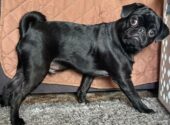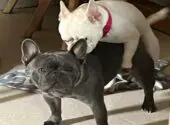French Bulldogs are undeniably adorable. Their cute flat snouts and big bat-like ears make them instantly recognizable, and their compact, stocky shape makes them an ideal size for town and city dwellers.
They have just enough energy to be funny and characterful, yet they aren’t so hyperactive as to be hard work and high maintenance. They are expressive and emotionally intelligent, yet they don’t bark much and won’t annoy the neighbors with their noise.
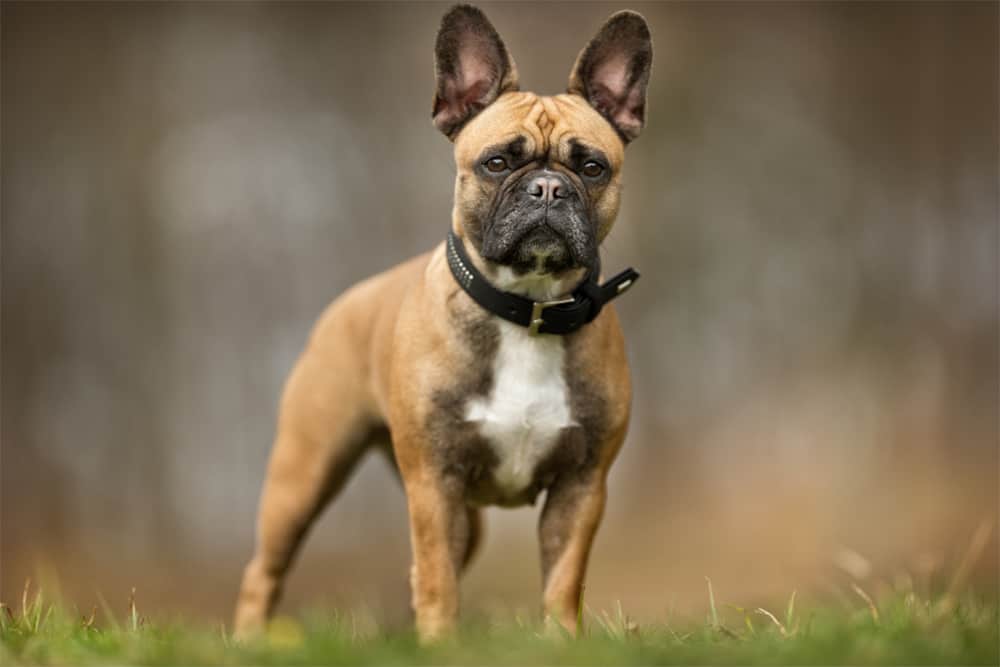
They are dinky enough to pick up and carry, yet they are also muscular and strong enough to look pretty badass and cool. Yes, these dogs are the perfect family pooch: cuddly, affectionate, eager and attentive, and they will bring joy and laughter to any household. However…
French Bulldogs are unfortunately not great for allergy sufferers. It turns out that all that affectionate nuzzling and snuggling might be the last thing you want to receive from a Frenchie if you suffer from common allergies, because their hair and saliva can cause serious reactions.
This may be deeply disappointing news for some avid dog-lovers out there, but fear not! There are plenty of wonderful hypoallergenic breeds available to buy who will make the perfect companion even to allergy sufferers.
So, read on to find out more about the French Bulldog, why it can cause allergic reactions, and which dog breeds are best suited to allergy sufferers.
What Is An Allergic Reaction?
An allergic reaction is when your body responds in a hyperactive way to a substance, animal or thing that it deems as harmful. Certain people who suffer from allergies will find that particular food stuffs or animals trigger an overly aggressive reaction in their body as it tries to defend against the stimulus.
This reaction can manifest as severe itching of the skin, puffiness or watering of the eyes, tightening of the throat and airways, sneezing and wheezing or breaking out in a rash.
In extremely serious cases, allergic reactions can be fatal, however this is very rare with animal allergies and relates more to food allergies.
What Are Common Allergies?
Common allergies include:
- Grass and tree pollen
- Dust mites
- Nuts (particularly peanuts)
- Shellfish
- Insect bites and stings
- Milk and eggs
- Ibuprofen, antibiotics or aspirin
- Latex
- Mould
- Animal hair, saliva and dander!
According to a recent survey, approximately 10% of all Americans are allergic to dogs!
That is a surprisingly high percentage. People can develop allergies at any time in their life, so even if you weren’t allergic as a child, you can become allergic as an adult.
Why Are People Allergic To Dogs?
When a person is allergic to dogs what their body is actually reacting against are the proteins contained in a dogs saliva, skin, and hair. This minute protein particle can form into allergen particles that build up on a dog’s skin and fur, and that are absolutely harmless to most humans.
Sadly for some however, these particles can trigger a hyperactive response when the dog sheds loose skin and hair particles, otherwise known as dander.
Doggy dander can get trapped in couches, rugs, carpets and clothes, as well as ending up on your hand after you have stroked a dog. And any contact with these allergens can cause great discomfort and pain for allergy sufferers.
What Does Hypoallergenic Mean?
The word Hypoallergenic refers to a substance, animal or thing that is not likely to cause an allergic reaction and is therefore suitable for allergy sufferers.
When you hear the word hypoallergenic in relation to pets, it is referring to animals (and in our case dog breeds) that are less likely to cause allergy sufferers to have allergic reactions.
In general these dog breeds shed less hair and skin and slobber less than other breeds. However, there are no 100% hypoallergenic dog breeds in the world, as all dogs have to shed and salivate at least a small amount.
Are French Bulldogs Hypoallergenic?
Unfortunately French Bulldogs are not a hypoallergenic breed. They have often been mistaken as being so due to the fact that they are short-haired and have a low maintenance coat, however it is not the case.
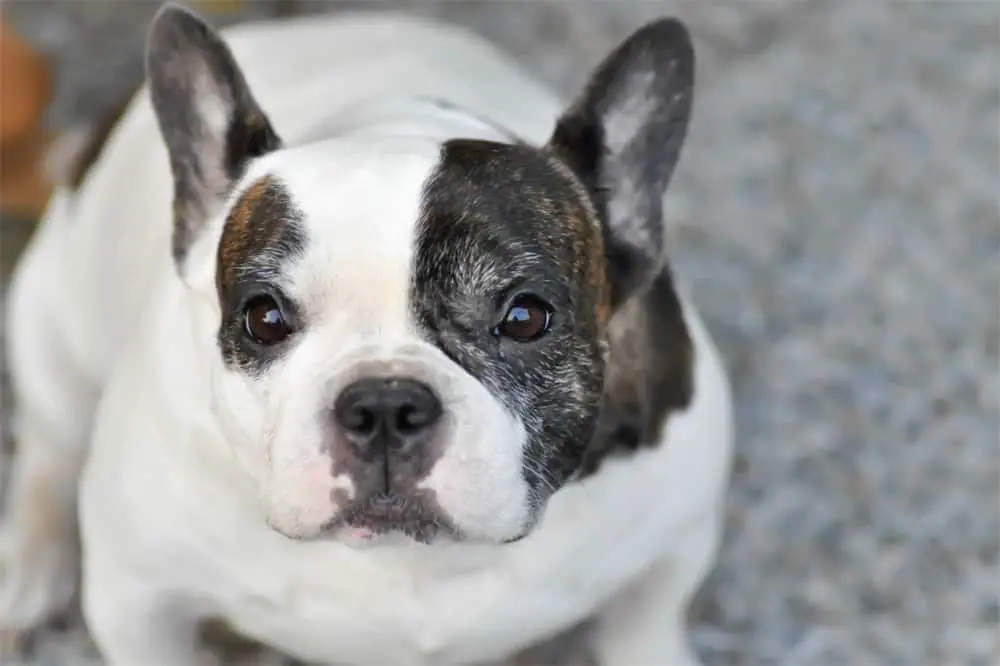
French Bulldogs are actually pretty bad for allergy sufferers due to their excessive drooling and the fact that they shed their fur pretty regularly.
Why Are French Bulldogs Bad For Allergy Sufferers?
If you know that you suffer from allergies then you should definitely think twice before settling on a French Bulldog as your pooch of choice.
There are a number of key factors that contribute to the problem which include: shedding, drooling and affectionate temperament.
Affectionate Temperament
French Bulldogs’ tough, short hair is particularly good at trapping dander. These dogs then spread their dander rather enthusiastically when they rub and roll against soft surfaces and fabrics.
As they are such affectionate creatures they are more likely to cover you in their dander as they snuggle and nuzzle you, and as they love attention they tend to jump up and down which encourages the spread even further.
Moderate / Heavy Shedding
What is more, French Bulldogs naturally shed their fur at a moderate rate all throughout the year. They will also shed a considerably larger amount of hair twice a year around spring and fall as they generate new coats.
During these periods of excessive shedding, allergy sufferers will react all the more strongly to these dogs and could become very uncomfortable indeed.
Heavy Drooling
Another factor that contributes to Frenchies’ incompatibility with allergy sufferers is their drool. Dog saliva contains lots of the proteins that form the allergen particles. These proteins can also be found in their urine, feces, fur and dander.
The trouble is that French Bulldogs love to french kiss! They have lots of facial secretions around their eyes and nose as well as the drool that comes from their mouth, and they love to rub and slobber all over their owners as a sign of affection and loyalty.
Although they only shed fur on a large scale a few times a year, they drool continuously, which means that there really is no let up for allergy sufferers.
Skin Irritations
A final contributing factor is that French Bulldogs are prone to skin inflammations and irritations due to their skin rolls and loose folds. When they get one of these reactions they scratch and itch more effusively and they will roll and rub against legs, furniture and anything else they can find to alleviate the sensation.
The irony is lost on no one, because just as they relieve their own itching they increase that of any allergy sufferers around them.
How Can I Make My Frenchie More Allergy Friendly?
If you are reading this as the owner of a Frenchie who has recently developed allergic reactions, don’t panic!
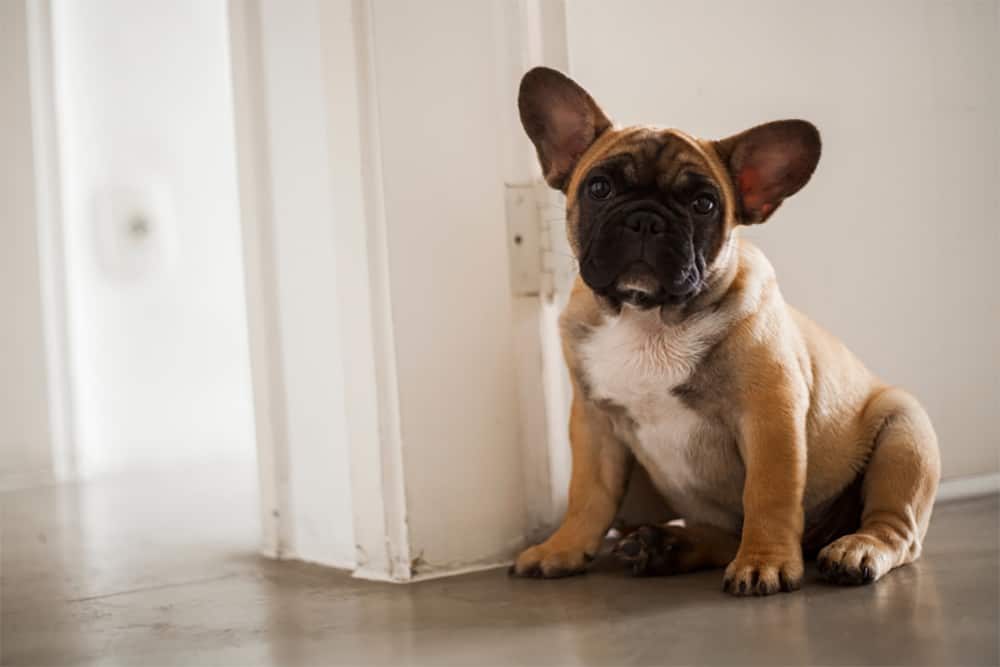
You do not have to cart your beloved woofer off to the pound just yet. There are lots of simple and effective steps that you can take to reduce your Frenchie’s allergy inducing effect.
Step 1: Regular Grooming
It sounds too simple to be effective, but really, if you regularly groom your Frenchie you will help to prevent a build up of dander by removing skin cells before they can land all over your couch.
This can seriously help to alleviate your allergic reactions around the house.
Step 2: Brushing with a Bristle Brush
By brushing your Frenchie’s coat with a medium bristle brush you will draw out loose hairs and prevent them from shedding over furniture and clothes, here again lessening your allergic reactions. However, be sure to wear a mask and glove while you do this so that you don’t swell up.
Step 3: Trim and Clean Facial Hair
By keeping your Frenchie’s facial hair short and cleanly you will reduce the build up of saliva and drool as well as dander and other secretions. This will mean that you won’t have to run a mile every time your Frenchie tries to give you a kiss!
Step 4: Quality Feeding
By feeding your Frenchie a balanced and healthy diet you can actually reduce the amount that they shed.
This is because they will be getting enough vitamins and minerals to keep their fur alive and healthy for longer! And as a bonus, you will also improve their general health and wellbeing at the same time!
Step 5: Personal Hygiene
Never mind washing and cleaning your pooch, if you stay on top of your own personal hygiene and make sure to wash your hands, hair and face regularly you will find that your allergic reactions decrease.
It is also a great idea to change your bedsheets regularly and wash any throws and rugs that you know your Frenchie loves to lie on.
Step 6: Pooch Pyjamas
No, you’re not going mad. There are such things as hypoallergenic pooch pyjamas that are especially designed to fit French Bulldogs. The hypoallergenic material allows you to cuddle and hang out with your Frenchie without the dramatic reactions, and they just so happen to look adorable too!
Should I Get A French Bulldog If I Suffer From Allergies?
Although all the steps above are really handy and will help to alleviate allergic reactions, it is still not advisable to get a French Bulldog if you suffer from allergies, or indeed if anyone you are particularly close to suffers from them.
This is because it is disruptive and upsetting for both owner and pet when a dog has to be re-homed.
As there are so many great hypoallergenic breeds out there, it is better to err on the side of caution and not get a French Bulldog if you are an allergy sufferer.
What Makes A Dog Hypoallergenic?
Although no dogs are 100% hypoallergenic, there are many breeds that are far less likely to cause allergic reactions than others. The main reason for this lies in their type of fur and their shedding pattern.
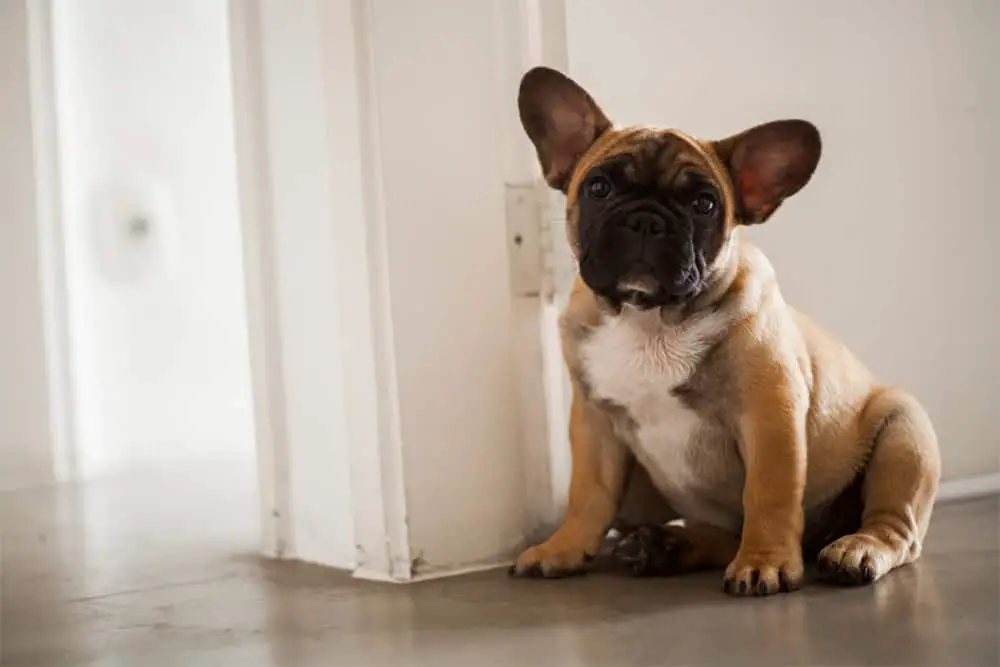
Minimal Or No Shedding
Hypoallergenic dogs tend to shed far less than other dogs, and some do not shed their fur at all. If a dog does not shed then it is less able to spread dander about your house and onto your person, thus reducing the risk of allergic reactions.
There is no exact science to this however, and the exact shedding pattern of a dog can be quite specific to the individual.
For this reason it is always best to enquire about a puppy’s parents’ shedding patterns to get a better idea of what their might be like, and if you are adopting a full grown dog it is best to spend as much time with it as possible before you make the commitment so that you know whether or not you are compatible.
Single Layer Coats
Hypoallergenic dogs also tend to have short, single layer coats as opposed to the thick, double layer coats that other dogs have. Double layer coats have an undercoat that sheds while the overcoat sits on top.
The fur from this undercoat will end up covering lots of surfaces in your home and of course, with fur comes dander. Therefore, short haired, single layered pooches are generally more hypoallergenic.
Hairless Dogs
Of course, some dogs don’t have hair at all! These hairless hounds are ideal for allergy sufferers because there simply is nothing for them to shed, and therefore they leave far less dander floating around in the atmosphere.
Which Dog Breeds Are Best For Allergy Sufferers?
Poodles are undoubtedly one of the most popular choices of hypoallergenic dogs out there. You may be surprised that these beauties are considered hypoallergenic because they are so famous for their curly and bounteous fur.
However, Poodles hardly shed at all, and their fur is often cut to a very short and manageable length and style, making them an ideal companion for allergy sufferers.
Another surprising hypoallergenic hound is the Afghan hound. These elegant and slender dogs are known for their long, straight, silky hair that falls like something from a Vidal Sassoon advert.
However, these flowing locks actually shed very rarely, and if you are up for some regular grooming duties then these regal and loyal lovelies make a great allergy free pet.
If you are after something smaller than a Poodle or Afghan then you will be pleased to hear that a Bichon Frise is a hypoallergenic dog. These adorable pooches are known for their gleaming white fur that is wonderfully soft and curly as a cloud.
The great thing is that the cloud does not shed very frequently, and when it does their hair is so curly the loose fibres get trapped in their undercoat so they don’t end up on your furniture.
These lap dogs will be able to sit on your lap without giving you a sneezing fit, but they will require regular brushing and grooming to prevent matting.
Another favorite hypoallergenic lap dog is the Maltese. These beautiful, white haired dogs are toy sized and can even fit in a handbag if you need them to. Like the Bichon Frise, they don’t shed their fur very often at all, however they do need brushing and grooming.
If you are looking for a dog that does not shed its fur at all then a Kerry Blue Terrier could be for you.
These amazingly intelligent and alert dogs have very low maintenance coats despite their curls, but they are one of the largest hypoallergenic breeds so they do require a good deal of space to stretch their legs in.
And for anyone who wants to go that one step further… The American Hairless Terrier is hairless all over its body, as is the Chinese Crested.
These bald beauties will turn heads when you take them for a stroll in the park and are wonderful companions for allergy sufferers with zero shedding whatsoever.
If you are looking for a great, medium sized family dog then the Standard Schnauzer is a great option.
The Giant and Miniature Schnauzers are also hypoallergenic breeds, but the Standard Schnauzer deserves mention for its great shape and size that is both convenient and loveable.
Although Schnauzers have a double layered coat, they shed very infrequently and if their fur is stripped not clipped you can prevent the build up of dirt and dander even more.

